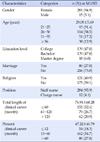Abstract
Purpose
The purpose of this study was to investigate the association between self-leadership, team trust, organizational commitment and identify the influencing factors on organizational commitment.
Methods
The subjects in the study were 296 conveniently selected general nurses at 2 general hospitals in Chungbuk Province. The measurements included the self-leadership, organizational trust inventory (OTI), and organizational commitment.
Results
The mean score for self-leadership was 3.40, the mean score for OTI was 3.61, and the mean score for organizational commitment was 3.07. There were significant correlations among self-leadership, team trust and organizational commitment. Self-leadership had significant correlation with team trust (r=.25, p<.001). Also, self-leadership (r=.34, p<.001) and team trust (r=.31, p<.001) showed significant correlation with organizational commitment. In stepwise multiple regression analysis, age, self-leadership and team trust were included in the factors affecting organizational commitment of clinical nurses. These variables explained 20% of organizational commitment.
Conclusion
The results confirmed that nurses' self-leadership and team trust affects significant influences on organizational commitment. Accordingly, in order to enhance nurses' organizational commitment, it is necessary to build effective strategies to enhance self-leadership and team trust for nurses. Such strategies will be able to improve the goal achievement of nursing unit.
Figures and Tables
Table 3
Correlation Coefficient of Self-leadership, Team Trust, and Organizational Committment (N=296)

References
1. Min BC, Lim SW, Kim HK, Rhee HS. The influence factors and effects of self-leadership: Focusing on members of the hospitals. Health Policy Manag. 2013; 23(1):66–77. DOI: 10.4332/KJHPA.2013.23.1.066.
2. Kang YS, Choi YJ, Park DL, Kim IJ. A study on nurses' self-leadership self-esteem, and organizational effectiveness. J Korean Acad Nurs Adm. 2010; 16:143–151.
3. Manz CC, Sims HP. The new superleadership: Leading others to lead themselves. San Francisco: Berrett-Koehler Publishers;2001. p. 127–144.
4. Song JS, Yang PS. A study on mediating effects of job satisfaction on the relationship between self-leadership and innovative behavior. Korean J Hum Resour Dev. 2008; 10(1):223–246.
5. Won HJ, Cho SH. A review of research on self-leadership in nurses'. J Korean Acad Nurs Adm. 2013; 19:382–393. DOI: 10.11111/jkana.2013.19.3.382.
6. Lee SJ. A study on the determinants of team effectiveness [master's thesis]. Seoul: Ewha Womans University;1999. 1–95.
7. Weick KE. The social psychology of organizing. 2nd ed. NY: McGraw-Hill;1979. p. 65–87.
8. Houghton J, Neck CP, Manz CC. Self-leadership and super leadership: The heart and the art of creating shared leadership in teams. In : Pearce CL, Conger JA, editors. Shared leadership: Reframing the hows and whys of leadership. Thousand Oaks: Sage Publications;2003. p. 123–140.
9. Konradt U, Andressen P, Ellwart T. Self-leadership in organizational teams: A multilevel analysis of moderators and mediators. Eur J Work Organ Psychol. 2009; 18(3):322–346. DOI: 10.1080/13594320701693225.
10. Laschinger HK, Finegan J, Shamian J. The impact of workplace empowerment, organizational trust on staff nurses' work satisfaction and organizational commitment. Health Care Manage Rev. 2001; 26(3):7–23.
11. Cummings LL, Bromiley P. The organizational trust inventory (OTI): Development and validation. In : Kramer R, Tyler T, editors. Trust in organizations. Thousand Oaks: Sage;1996. p. 302–330.
12. Hsu CP, Chiang CY, Chang CW, Huang HC, Chen CC. Enhancing the commitment of nurses to the organisation by means of trust and monetary reward. J Nurs Manag. 2015; 23:567–576. DOI: 10.1111/jonm.12180.
13. Cho YJ, Park H. Exploring the relationships among trust, employee satisfaction, and organizational commitment. Public Manag Rev. 2011; 4:551–573. DOI: 10.1080/14719037.2010.525033.
14. An N. The effects of co-workers trust on group performance: A mediating role of collective intelligence and a moderating role of task interdependence [master's thesis]. Busan: Pusan National University;2014. 1–108.
15. Bligh MC, Pearce CL, Kohles JC. The importance of self and shared leadership in team based knowledge work: A meso-level model of leadership dynamics. J Manag Psychol. 2006; 21(4):296–318.
16. Manz CC. The art of self-leadership: Strategies for personal effectiveness in your life and work. Englewood Cliffs, NJ: Prentice-Hall;1983. p. 1–115.
17. Kim HS. The relationship between self-leadership and job satisfaction of middle school teacher [master's thesis]. Seoul: Soongsil University;2003. 1–83.
18. Meyer JP, Allen NJ, Smith CA. Commitment to organizations and occupations: Extension and test of a three-component model. J Appl Psychol. 1993; 78:538–551.
19. Kim IS, Won SA, Kang SJ, Shin SM. The relationship among nurses' perception of super-leadership, self-leadership and organizational commitment. J Korean Acad Nurs Adm. 2016; 22:148–157. DOI: 10.11111/jkana.2016.22.2.148.
20. Han SJ. A study on the relationship between nursing organizational culture and organizational performance [dissertation]. Seoul: Ewha Womans University;2000. 1–131.
21. Park KN, Park MK. A study on nurses' self-leadership, organizational commitment and the nursing performance. J Korean Acad Nurs Adm. 2008; 14:63–71.
22. Choi AS, Oh PJ. A study on self-leadership, fall attitude, and nurses' behavior to prevent patient falls. J Korean Acad Nurs Adm. 2013; 19:394–403. DOI: 10.11111/jkana.2013.19.3.394.
23. Han Y, Park Y. Effects of self-leadership and job involvement on clinical competence in general hospital nurses. J Korean Acad Nurs Adm. 2013; 19:462–469. DOI: 10.11111/jkana.2013.19.4.462.
24. Ugurluoglu O, Saygılı M, Ozer O, Santas F. Exploring the impact of personal factors on self-leadership in a hospital setting. Int J Health Plann Manage. 2015; 30(1):3–13. DOI: 10.1002/hpm.2199.
25. Choi EJ. The impact of organizational communication satisfaction on the trust among clinical nurses. Department of Nursing Administration [master's thesis]. Seoul: Hanyang University;2015. 1–73.
26. De Jong B, Elfring T. How does trust affect the performance of ongoing teams? The mediating role of reflexivity monitoring and effort. Acad Manag J. 2014; 53:535–549. DOI: 10.5465/AMJ.2010.51468649.
27. Jung CS. The effects of the self-leadership enhancing program on nursing student [master's thesis]. Daegu: Kyungpook National University;2015. 1–45.
28. Park EH. Development and the effects of self-leadership reinforcement program for hospital nurses [dissertation]. Chuncheon: Kangwon National University;2016. 1–114.
29. Im MK. The relationship among types of nursing organizational culture, self-leadership and burnout in operating room [master's thesis]. Seoul: Sungkyunkwan University;2015. 1–65.
30. Jeong YK, Yi OK. A study on the relationship between organizational culture, self-leadership, and organizational effectiveness. Korean Rev Manag Consult. 2012; 3(2):53–77.




 PDF
PDF ePub
ePub Citation
Citation Print
Print






 XML Download
XML Download